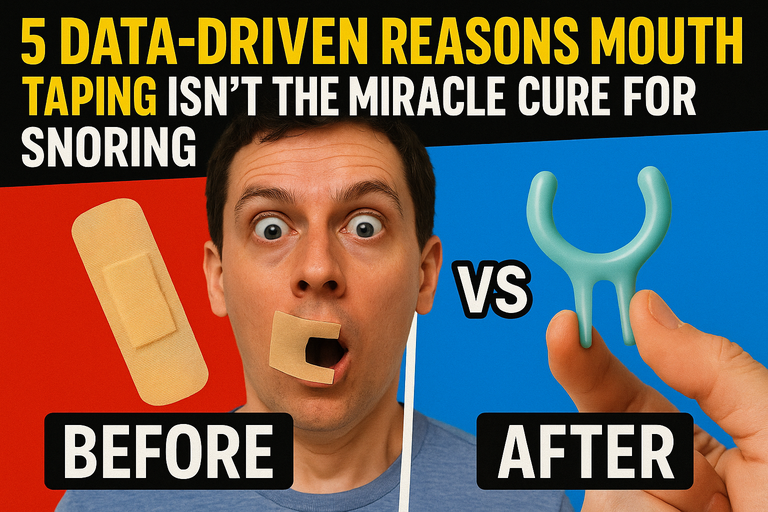You’ve probably heard the buzz: mouth taping is the new trend promising better sleep and less snoring. But is it really the miracle fix some claim it to be? On June 26, 2025, the New York Post published a revealing article titled Mouth taping touted by some for better sleep as experts cite safety concerns, stirring up quite the conversation in the sleep community.
The idea sounds simple and elegant—seal your mouth shut with tape to encourage nasal breathing and prevent snoring caused by an open mouth. Proponents say it leads to deeper, quieter sleep. But is this 'hack' actually safe or effective for everyone? Let’s unpack the data and expert opinions to get a clear picture.
Why Mouth Taping Is Gaining Popularity
Mouth taping skyrocketed in popularity largely due to anecdotal reports and social media influencers. The fundamental principle is straightforward: by keeping the mouth closed during sleep, you reduce the likelihood of airflow disruptions that cause snoring. Nasal breathing can improve oxygenation and may reduce the vibration of soft tissues in the throat.
However, while the concept is appealing, it overlooks essential safety considerations. Experts cited in the New York Post article warn that mouth taping might pose risks, particularly for individuals with nasal obstructions, respiratory issues, or sleep apnea.
What Are the Real Risks?
Doctors stress that sealing the mouth can lead to dangerous breathing difficulties if a person relies on mouth breathing during sleep. Conditions like nasal congestion, deviated septum, or allergies can impair nasal airflow, and forcing nasal-only breathing can cause panic or oxygen deprivation.
Moreover, for people with obstructive sleep apnea (OSA), mouth taping can actually worsen symptoms by increasing airway resistance or causing choking sensations. This is a crucial point often missed in informal discussions about the practice.
So What Does Science Say?
While comprehensive large-scale studies on mouth taping remain limited, the consensus among sleep specialists is clear: it’s not a universal fix and can be unsafe without medical consultation. On the other hand, evidence-backed solutions like mandibular advancement devices (MADs) or tongue stabilizing devices (TSDs) provide safer and more effective approaches for snoring and mild to moderate OSA.
Enter Snorple’s Customizable Anti-Snoring Mouthpiece
For those looking for a scientifically grounded, comfortable, and safer alternative, devices like the Snorple Anti-Snoring Mouthpiece deliver a personalized solution by combining mandibular advancement and tongue stabilization. Made from hypoallergenic, latex-free materials, Snorple’s mouthpiece uses a boil-and-bite process for a custom fit and offers adjustable jaw advancement settings to optimize comfort and effectiveness.
Independent reviews highlight its ease of preparation—even in a microwave, a notable convenience over traditional boiling methods—and its ability to significantly reduce snoring for over 100,000 satisfied customers. Plus, Snorple backs their product with a 30-day money-back guarantee, underscoring confidence in its results.
When Considering Mouth Taping or Any Snoring Remedy, Ask Yourself:
- Do I have any nasal obstructions, allergies, or breathing issues? If yes, mouth taping could be risky.
- Have I consulted a healthcare professional about my snoring or sleep apnea? Professional diagnosis is key.
- Am I looking for a customizable, medically informed snoring solution? Devices like Snorple’s mouthpiece may offer that balance.
In Summary
Mouth taping is a trendy, low-cost approach to improving sleep quality and reducing snoring. Yet, it carries safety concerns that should not be overlooked. Before trying it, especially if you suspect any underlying respiratory issues, talk to your doctor.
If you want a proven, adjustable, and user-friendly method that addresses the root causes of snoring, consider scientifically supported alternatives like the Snorple mouthpiece. It practically bridges the gap between comfort, customization, and clinical efficacy.
Have you tried mouth taping or other snoring remedies? What worked for you? Drop your experiences below and join the conversation!
For more detailed information on effective anti-snoring solutions, check out Snorple’s official site here.
And don’t forget to read the full article that inspired this discussion: Mouth taping touted by some for better sleep as experts cite safety concerns. Your path to a quieter, healthier night starts with informed choices!
